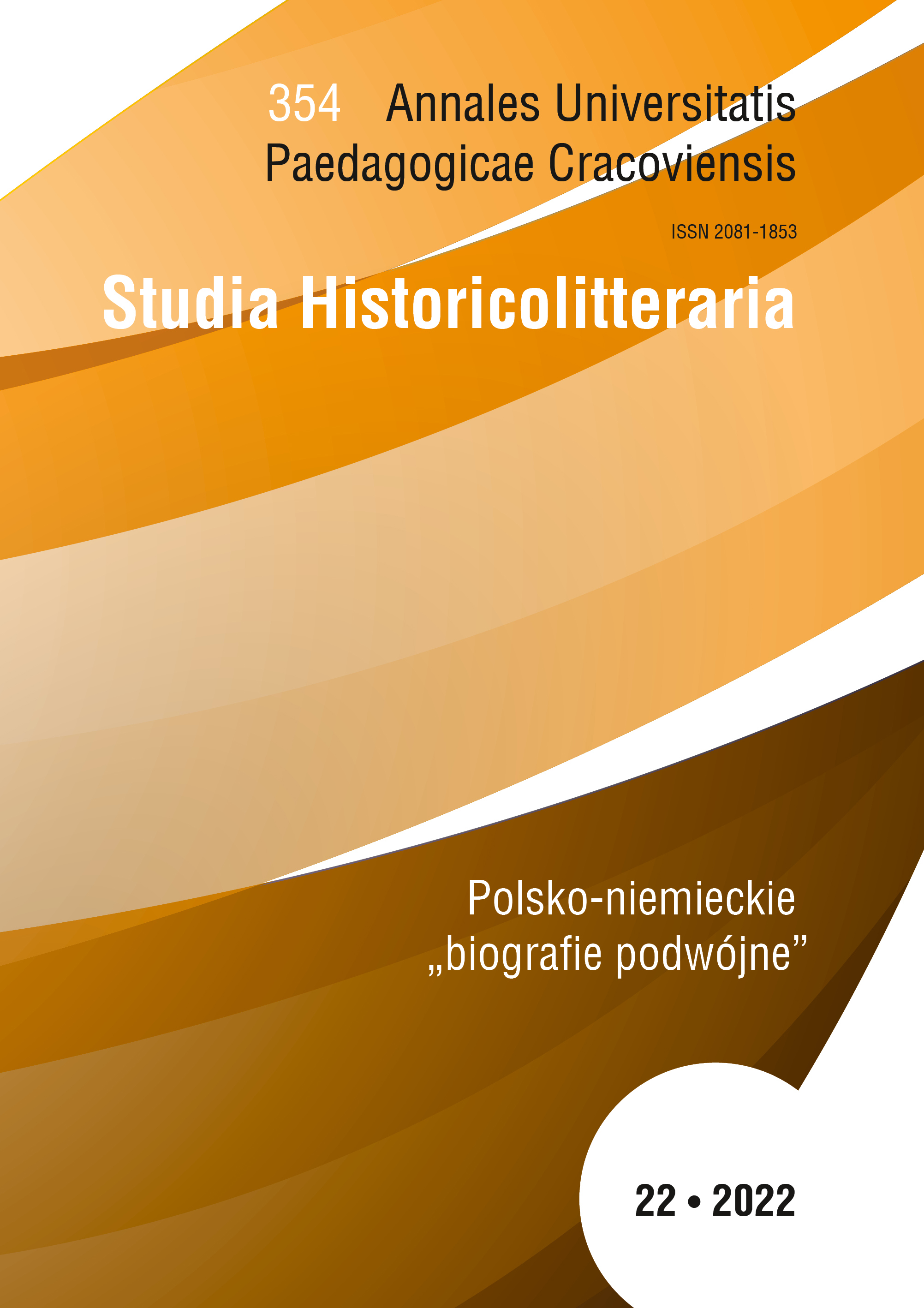Reality and fiction. The characters of Poles and Germans in the prose of Magdalena Parys
Main Article Content
Abstract
he article presents the Trylogia Berlińska [The Berlin Trilogy] by Magdalena Parys, a Polish writer living in Berlin. The series consists of three thrillers (Tunel, 2011; Magik, 2014; Biała Rika, 2016 [Tunnel, Magician, White Rika]) which critics have described as „political thrillers”. In the multi-threaded plots, set both in the contemporary and historical realities (World War II and the immediate post-war period), Polish émigrés, rooted in the Berlin’s metropolitan area, without complexes and pursuing their professional goals play a special role. The Poles include representatives of the middle generation - Germans of Polish descent, policemen, photographers, journalists who investigate vicious and unsolved murder cases. The confrontation of characters of Polish descent with their German peers, whose parents and grandparents live with the trauma of expulsion or of being a victim of Stasi surveillance, makes the reader think about the memory and the problem of German-Polish relations in the 21st century.
Downloads
Article Details

This work is licensed under a Creative Commons Attribution-NonCommercial-NoDerivatives 4.0 International License.
COPYRIGHT POLICY
The publisher of "Annales Universitatis Paedagogicae Cracoviensis.Studia Historicolitteraria" is authorised to use and distribute all the materials published in the journal on the basis of a non-exclusive licence agreement unlimited in time – previously concluded for an indefinite period of time each time with the author of a specific paper in the fields of exploitation specified in the agreement.
OPEN ACCESS POLICY
"Annales Universitatis Paedagogicae Cracoviensis.Studia Historicolitteraria” is an open access journal, and all its contents are available for free to users and/or their institutions on the basis of non-exclusive licenses under Creative Commons (CC BY CC-BY-4.0). Users can read, download, make copies, distribute, print, search, or to link to full text articles in this journal without the prior permission of the publisher or the author.This is consistent with the definition of open access BOAI (http://www.soros.org/openaccess).
References
Teksty literackie
Parys M., Biała Rika, Kraków 2016.
Parys M., Książę, Warszawa 2020.
Parys M., Magik, wyd. II, poprawione, Warszawa 2020.
Parys M., Tunel, wyd. II, Warszawa 2020.
Opracowania
Burszta W.J., Czubaj M., Kryminalna odyseja oraz inne szkice o czytaniu i pisaniu, Gdańsk 2017.
Czechowicz J., Sofia, Berlin, pamięć i życie, http://krytycznymokiem.blogspot.com/2015/01/magik-magdalena-parys.html (dostęp: 23.08.2022).
Fijał D., Czytam, bo chcę i już. Recenzja książki M. Parys „Książę”, https://dofi.com.pl/tag/ksiaze/-magdalena-parys (dostęp: 23.08.2022).
Kąkiel M., Fakty i fikcja, „Nowe Książki” 2016, nr 10, s. 36–37 [rec. M. Parys, Biała Rika].
Helbig-Mischewski B., Warto kopać jeszcze głębiej, „Odra” 2012, nr 3, s. 120–121 [rec. M. Parys, Tunel].
Mizuro M., Podziemną ścieżką, „Polityka” 2012, nr 4, s. 64.
Orski M., Historia z wyobraźni, „Odra” 2015, nr 10, s. 114–116 [rec. M. Parys, Magik].
Orski M., Nie będzie polsko-niemieckiej wspólnoty, „Odra” 2016, nr 9, s. 111–112.
Piasek W., Powieść kryminalna jako źródło do antropologicznego poznania współczesności, „Rocznik Antropologii Historii” 2012, nr 1, s. 359–370.
Polskie końcówki. Z Magdaleną Parys o powieści Magik rozmawia Maciej Robert, „Tygiel Kultury” 2015, nr 1–6, s. 148–159.
Sobolewska J., „Parys-Berlin”. Polska pisarka opowiada Niemcom historię?, „Polityka” 2015, nr 9, s. 88.
Suszek E., (Anty)Magik. Recenzja książki Magdaleny Parys „Magik”, „FA-art” 2014, nr 4, s. 118–120.
Szaruga L., Zaułek Leszka Szarugi. Stan rzeczy, „Biała Rika” Magdaleny Parys, „Borussia” 2016, nr 57, s. 247–248.
Szewczyk P., Tożsamość? To zbyt skomplikowane, „Twórczość” 2017, nr 4, s. 126–127 [rec. M. Parys, Biała Rika]
